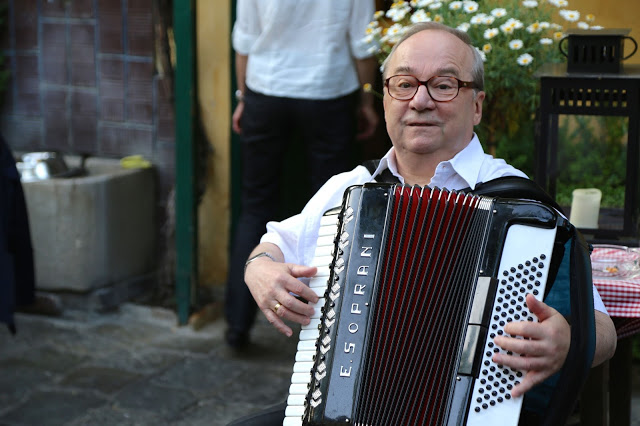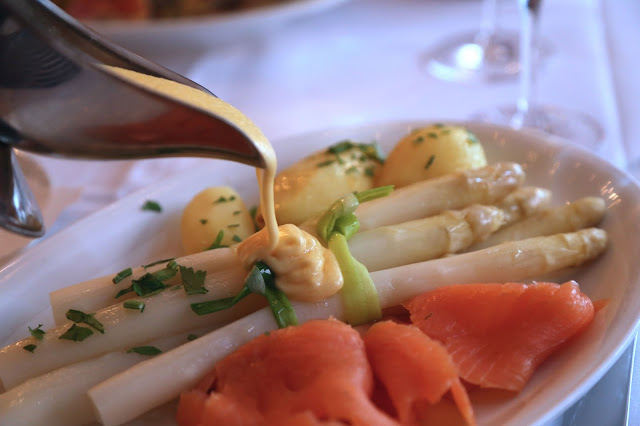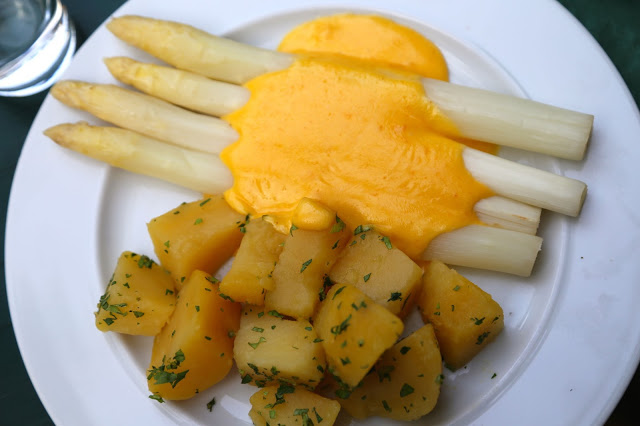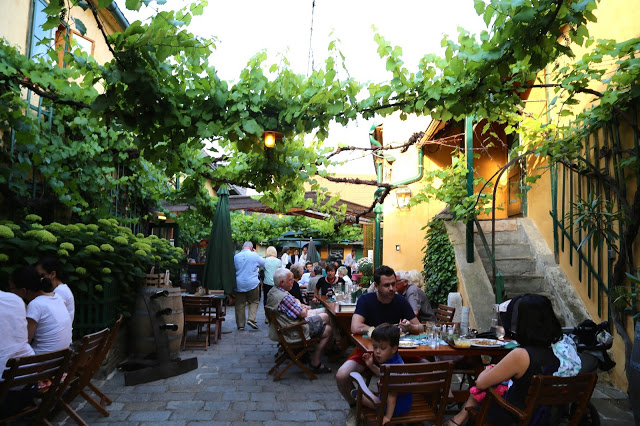German and Austrian wines have a slightly dodgy reputation – sweet white sickly wines like Blue Nun and Liebfraumilch – but this is a dated attitude. Although this article still hates German wines. During my visit to Berlin and Vienna, I drank German and Austrian wines with most meals and I was impressed.
The most famous German grape is Riesling, mostly grown near the Rhine river, but also further south, in the Alsace and in parts of Austria. Riesling has a strong character, with petrol notes, which can be a bit controversial. The vines, being so northerly, are picked very late, much later than other wines, starting at the end of September and even onto January, unlike wines in more southern regions of the world, where picking begins in August. For this reason German wines are labelled in terms of how late they are picked, a system called Prädikatswein, with different levels of lateness/ripeness starting with kabinett, Spatlese then Auslese, beerenauslese, eiswein, and finally Trockenbeerenauslese. When wines are picked later in the season, they generally have a higher sugar content; the higher the sugar content, the more ageing a wine can stand. Good Rieslings can be aged for between ten and thirty years.
Most Rieslings are fairly sweet, but there are also dry ones. Look for the words trocken (dry), halbtrocken (half-dry, quite sweet), feinherb (a bit sweeter) and lieblich (sweet, usually of lower quality). I find as I grow older, I enjoy sweeter wine such as dessert wines: beerenauslese, eiswein, and Trockenbeerenauslese are delicious as end of meal wines especially with a cheese board.
Riesling is one of the few wines that can be drunk with sushi and Asian food in general – anything from a strong oily spicy Indian curry, a citrus coriander light Vietnamese pho, a zingy Thai hot and sour soup or a Chinese stir fry.
The most famous Austrian grape is Gruner Veltliner or ‘gru-ve’, much flintier than Riesling. In various tastings Gruner Veltliner has consistently beaten top French whites. In Vienna I visited a ‘heuriger’, something similar to a beer garden, but for wines. Vienna is fairly unique in having vineyards actually within the city. When the wine garden is open, a garland of pine cones is hung over the door (as can be seen in the picture above). Traditionally, heurige only serve the wine that they make, generally a young wine. In fact ‘heurige’ means ‘this years wine’. I sat in the garden and ate plates of cheeses, pickles, or liptauer (a cheesy pimento dip) while listening to accordion music. Although the weather was sweltering, it was a pleasant evening under the vine-covered trellis in the shade, with lederhosen-clad jolly hosts slapping one on the back. Definitely a sight not to be missed if you visit Austria.
Read the rest of the article on Winetrust100.com where you can try out some great German or Austrian wines.


Don’t forget to come and see myself and Winetrust’s Master of Wines, Nick Adams, at the Bury St Edmunds theatre on September 8th. This is an original Regency theatre and all proceeds go to help support this theatre. It is an evening of conversation where I will be talking about my books (you can also buy signed copies) and discussing wine matches with Nick. There will be wine tasting for the audience too.
Book tickets here: http://www.theatreroyal.org/shows/msmarmitelover-and-winetrust/








Not a lover of sweet wines myself but have recently found enjoyment in Rieslings – especially a trocken with sushi . Please name some as I can't remember the name of the last one I bought.
If you follow the link to the winetrust piece you can see a whole bunch of recommendations. True it does go with sushi. I think one just has to be a bit careful what you eat while drinking rieslings. They tend to like dry wines in Germany itself. I really like the Ein, zvei, Dry http://winetrust100.co.uk/shop/eins-zwei-dry-riesling-trocken-leitz-2/
I moved to the Rheingau, Riesling country, in 2010, and have come to absolutely adore German whites (and the odd red). We are really lucky to live where we do and be able to go off and get boxes of wine from family-run wineries on weekends (they generally have really rubbish wine selections in the supermarkets). In this area and in the Pfalz, a bit further south where it's much milder, they produce some incredible wines, including sparkling ones, and I think it's a massive shame that they are so little known in the UK. Am doing my best to convert my mates back in London though 😉
I'd like to visit more of Germany…all those fairy tale castles in Bavaria
Nothing worse than a wine snob. I love sweet wines, always have. It’s just what I prefer. I never begrudge anyone whatever wine floats their boat. Taste buds don’t have a class or social status. I am self confident enough to enjoy my liebfraumilch in full view of the public without any shame.
Many years ago, Blue Nunn sold Liebfraumilch labeled as such. Visiting some friends, we brought 2 750ml bottles of this wine. The four of us loved the new taste, we polished them of in a jiff ! We needed more ! Drove to the nearest packy and scored the last three bottles ! Liebfraumilch is scarce now and Reisling has taken over. Liebfraumilch is 70% Riesling but has added citrus, pear and apple additives,
I’m trying to make my own at home, wish me luck.
You are making your own Liebfraumilch at home??? amazing!